
Global electronics components and solutions distributor Arrow Electronics (NYSE: ARW) reported Q3 CY2024 results beating Wall Street’s revenue expectations, but sales fell 14.8% year on year to $6.82 billion. On the other hand, next quarter’s revenue guidance of $6.97 billion was less impressive, coming in 3.9% below analysts’ estimates. Its non-GAAP profit of $2.38 per share was also 7.2% above analysts’ consensus estimates.
Is now the time to buy Arrow Electronics? Find out by accessing our full research report, it’s free.
Arrow Electronics (ARW) Q3 CY2024 Highlights:
- Revenue: $6.82 billion vs analyst estimates of $6.73 billion (1.4% beat)
- Adjusted EPS: $2.38 vs analyst estimates of $2.22 (7.2% beat)
- EBITDA: $215.9 million vs analyst estimates of $264.9 million (18.5% miss)
- Revenue Guidance for Q4 CY2024 is $6.97 billion at the midpoint, below analyst estimates of $7.25 billion
- Adjusted EPS guidance for Q4 CY2024 is $2.58 at the midpoint, below analyst estimates of $3.43
- Gross Margin (GAAP): 11.5%, in line with the same quarter last year
- Operating Margin: 2.6%, down from 4.2% in the same quarter last year
- EBITDA Margin: 3.2%, down from 5.3% in the same quarter last year
- Free Cash Flow Margin: 0.9%, down from 3.8% in the same quarter last year
- Market Capitalization: $7.19 billion
Company Overview
Founded as a single retail store, Arrow Electronics (NYSE: ARW) provides electronic components and enterprise computing solutions to businesses globally.
Engineered Components and Systems
Engineered components and systems companies possess technical know-how in sometimes narrow areas such as metal forming or intelligent robotics. Lately, automation and connected equipment collecting analyzable data have been trending, creating new demand. On the other hand, like the broader industrials sector, engineered components and systems companies are at the whim of economic cycles. Consumer spending and interest rates, for example, can greatly impact the industrial production that drives demand for these companies’ offerings.
Sales Growth
Reviewing a company’s long-term performance can reveal insights into its business quality. Any business can have short-term success, but a top-tier one sustains growth for years. Over the last five years, Arrow Electronics’s sales were flat. This shows demand was soft and is a tough starting point for our analysis.
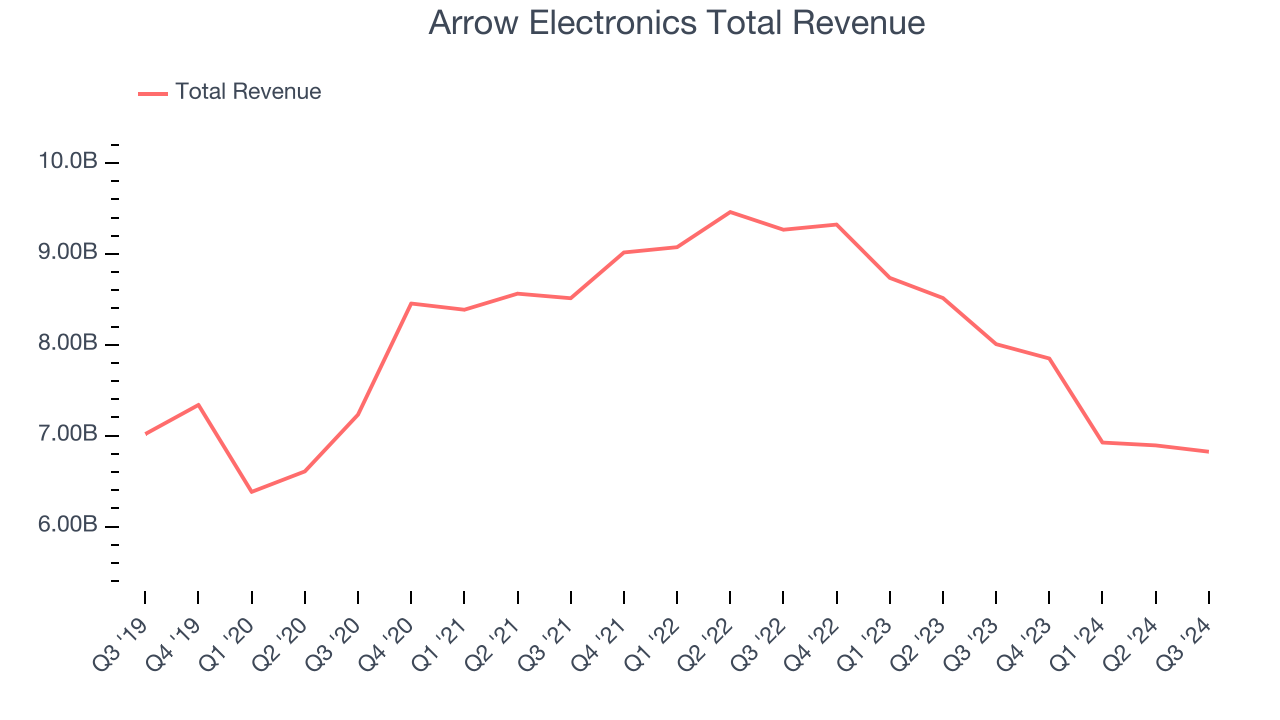
We at StockStory place the most emphasis on long-term growth, but within industrials, a half-decade historical view may miss cycles, industry trends, or a company capitalizing on catalysts such as a new contract win or a successful product line. Arrow Electronics’s recent history shows its demand has stayed suppressed as its revenue has declined by 12% annually over the last two years. 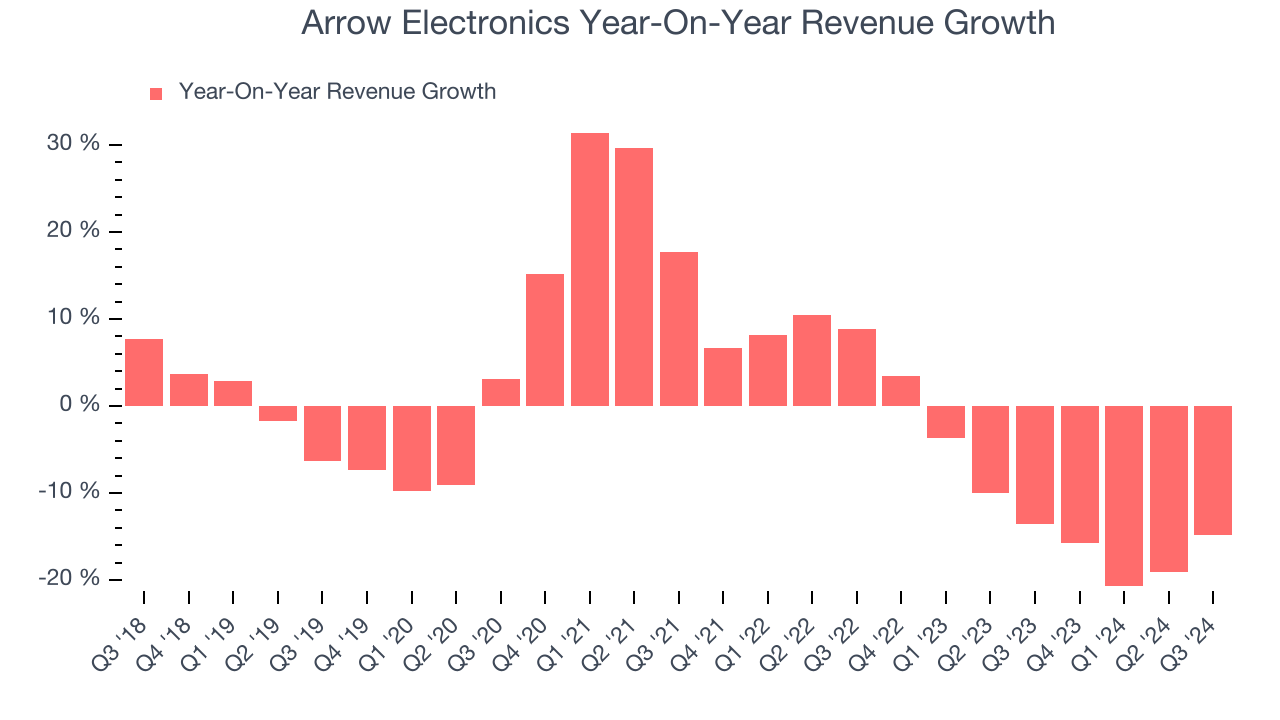
We can better understand the company’s revenue dynamics by analyzing its most important segments, Components and ECS, which are 72.5% and 27.5% of revenue. Over the last two years, Arrow Electronics’s Components revenue (electronic component sales) averaged 14.3% year-on-year declines while its ECS revenue (computing solutions and services) averaged 2.8% declines.
This quarter, Arrow Electronics’s revenue fell 14.8% year on year to $6.82 billion but beat Wall Street’s estimates by 1.4%. Management is currently guiding for a 11.2% year-on-year decline next quarter.
Looking further ahead, sell-side analysts expect revenue to remain flat over the next 12 months, an improvement versus the last two years. Although this projection illustrates the market believes its newer products and services will fuel better performance, it is still below average for the sector.
Unless you’ve been living under a rock, it should be obvious by now that generative AI is going to have a huge impact on how large corporations do business. While Nvidia and AMD are trading close to all-time highs, we prefer a lesser-known (but still profitable) semiconductor stock benefitting from the rise of AI. Click here to access our free report on our favorite semiconductor growth story.
Operating Margin
Operating margin is one of the best measures of profitability because it tells us how much money a company takes home after procuring and manufacturing its products, marketing and selling them, and, most importantly, keeping them relevant through research and development.
Arrow Electronics was profitable over the last five years but held back by its large cost base. Its average operating margin of 4.2% was weak for an industrials business. This result isn’t too surprising given its low gross margin as a starting point.
Analyzing the trend in its profitability, Arrow Electronics’s annual operating margin might have seen some fluctuations but has generally stayed the same over the last five years, which doesn’t help its cause.
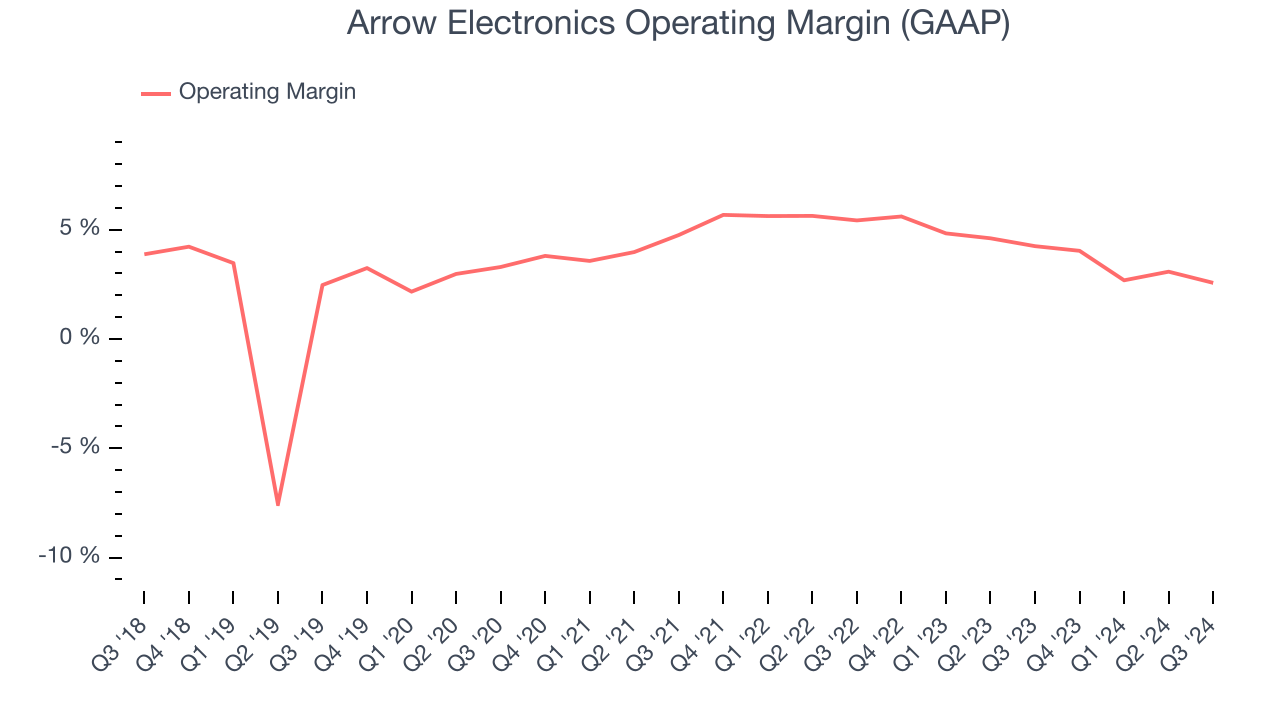
In Q3, Arrow Electronics generated an operating profit margin of 2.6%, down 1.7 percentage points year on year. Since Arrow Electronics’s operating margin decreased more than its gross margin, we can assume it was recently less efficient because expenses such as marketing, R&D, and administrative overhead increased.
Earnings Per Share
Analyzing revenue trends tells us about a company’s historical growth, but the long-term change in its earnings per share (EPS) points to the profitability of that growth – for example, a company could inflate its sales through excessive spending on advertising and promotions.
Arrow Electronics’s EPS grew at an unimpressive 7.8% compounded annual growth rate over the last five years. This performance was better than its flat revenue but doesn’t tell us much about its business quality because its operating margin didn’t expand.
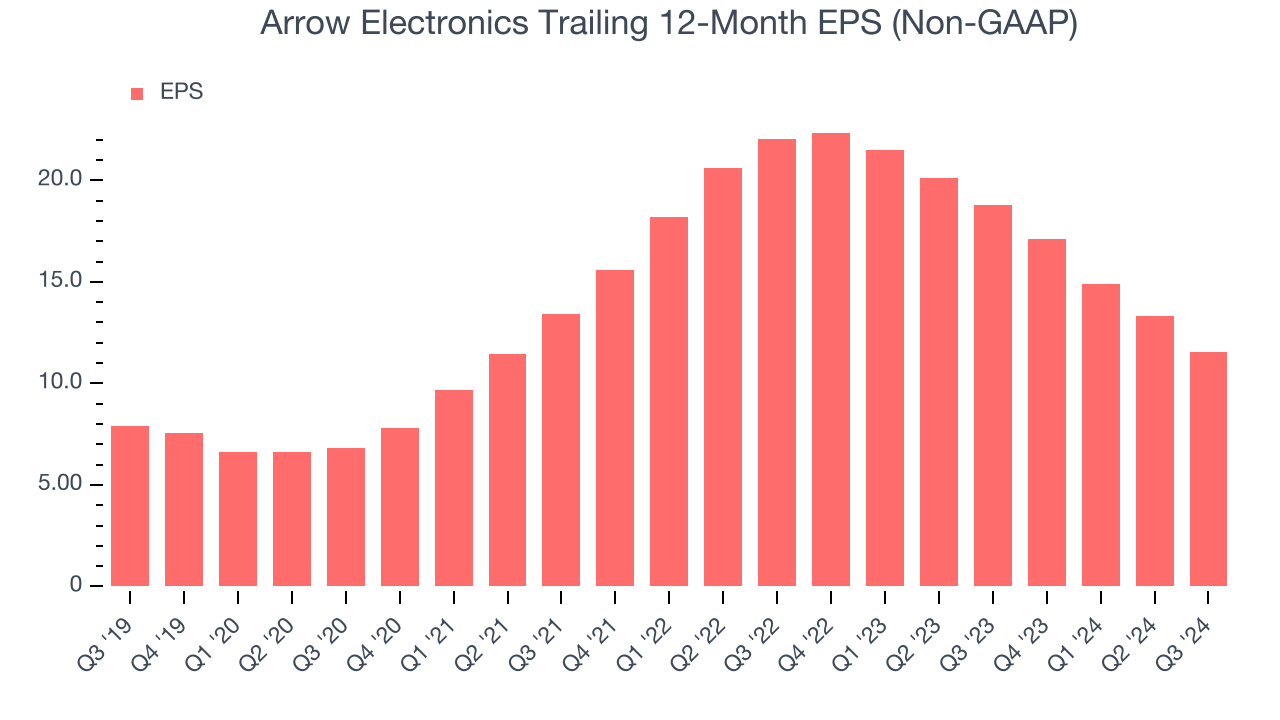
Diving into the nuances of Arrow Electronics’s earnings can give us a better understanding of its performance. A five-year view shows that Arrow Electronics has repurchased its stock, shrinking its share count by 35.9%. This tells us its EPS outperformed its revenue not because of increased operational efficiency but financial engineering, as buybacks boost per share earnings. 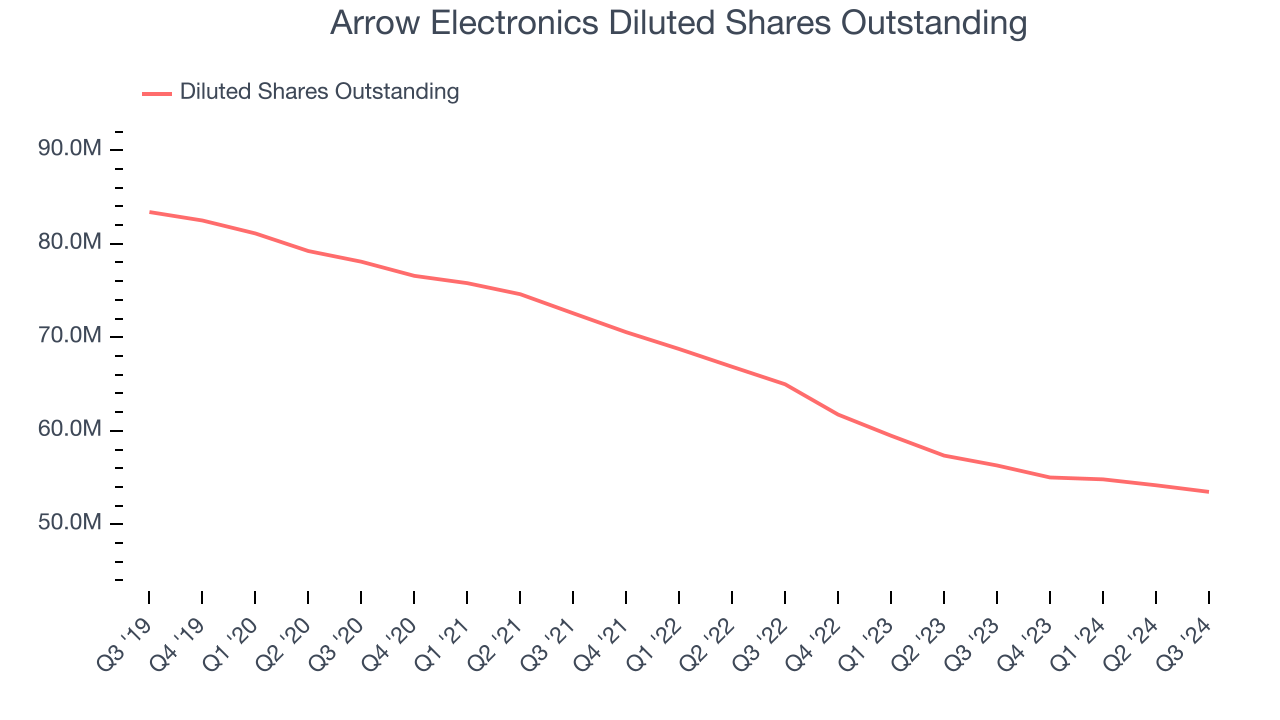
Like with revenue, we analyze EPS over a shorter period to see if we are missing a change in the business.
For Arrow Electronics, its two-year annual EPS declines of 27.6% show it’s continued to underperform. These results were bad no matter how you slice the data.In Q3, Arrow Electronics reported EPS at $2.38, down from $4.14 in the same quarter last year. Despite falling year on year, this print beat analysts’ estimates by 7.2%. Over the next 12 months, Wall Street expects Arrow Electronics’s full-year EPS of $11.55 to grow by 15.9%.
Key Takeaways from Arrow Electronics’s Q3 Results
We enjoyed seeing Arrow Electronics exceed analysts’ ECS revenue expectations this quarter. We were also glad its revenue outperformed Wall Street’s estimates. On the other hand, its EBITDA missed and its EPS guidance for next quarter fell short of Wall Street’s estimates. Overall, this was a softer quarter. The stock traded down 1.9% to $133.33 immediately after reporting.
Arrow Electronics’s earnings report left more to be desired. Let’s look forward to see if this quarter has created an opportunity to buy the stock. What happened in the latest quarter matters, but not as much as longer-term business quality and valuation, when deciding whether to invest in this stock. We cover that in our actionable full research report which you can read here, it’s free.





